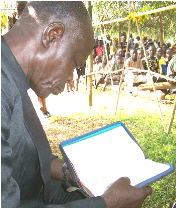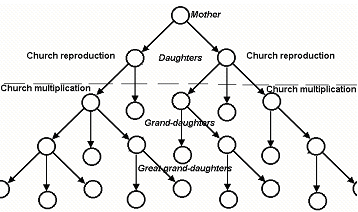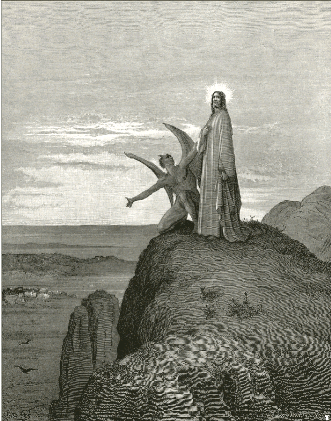
Pastor’s Storybook III–4
Study, Teach and Apply the Word of God

Learner visits his brother Helper, who lives a few kilometres from Learner's home, to mentor him and see how his work is going. Caregiver, the schoolteacher, lives near helper and attends the mentoring session. At first he attended Learner’s congregation but now meets with Helper’s new group, nearer to where he lives.
After prayer, Helper explains his plans. “Learner, you have encouraged me to start a new congregation here with those that follow Christ. I need your help. I am confused about the different rules that people tell me the new congregation must follow.”
Caregiver adds, “I am also confused. My brother-in-law Mr. Foolish wants to come and lead this new congregation. He insists that Helper is too young and must spend several years at a Bible school before he can be a pastor. He says the apostle Paul studied the Bible in a school in Jerusalem. He has said this to almost everyone in our group. Others are also saying that we must do things in another way. Some want to use candles and other things in our worship. Everyone wants to tell our new congregation what to do!”

Learner assures them, “Simply obey Jesus above all else. That is the foundation for your new congregation. If you do not establish its authority on the commands of Christ, Satan will rush in and fill the vacuum, and you will always have the same confusion. Remember the three levels of authority:
First do what Christ and His apostles commanded, before all else.
Second, you have the freedom to do the other things that the apostles practiced but did not command, but you do not demand that all congregations do them because only God can make rules for the whole church on earth.
Third, examine any human traditions to make sure that they edify your new congregation and do not hinder obedience.”
Caregiver asks, “Which of the three levels of authority applies to attending a Bible school?”
Learner bounces the question back, “What do you think?”
Caregiver pauses for a moment, then reasons, “Christ never commanded us to graduate from an academic institution. The apostles did not send the shepherds they named away for training to a school separate from the church bodies. So it belongs to the third level of authority, human tradition, the lowest level.”
“Correct. This does not mean that institutional training is wrong, but simply that we must not demand it in place of the methods that the Bible reveals for us to use. You are free to choose the method that works best for you here. An academic institution apart from the churches is beneficial under certain conditions, where churches are strong and there are enough well educated pastors. But it does not sustain a new movement like ours.”
Caregiver asks, “To which of the three levels of authority should we assign apprenticing new leaders like Paul did?”
Learner answers, “Our Lord Jesus Christ and the apostles mentored their apprentices, but did not command it. So mentoring new leaders is level two, an optional apostolic practice. I prefer to train Helper the same way that Mr. Wise has been training me. We try to do it the same way that Jesus and Paul trained new leaders. Mr. Wise said that he imitates the apostle Paul, who trained many new shepherds. One of these new shepherds that Paul took with him to apprentice was young but a spiritually mature man named Timothy. Later, while Paul was travelling to start congregations in other lands—or sitting in a jail in Rome—he wrote letters to Timothy to encourage him and explain how to be a good shepherd. He told him to train others who would train still others, for a reproductive chain effect.”

“I see what you mean by the reproductive chain,” Caregiver says. “Mr. Wise trained Learner and others. Learner trains you, Helper. You train other leaders as we work in the new congregations. I want you to show me how to use the Bible like Mr. Wise does. Then we will all follow the Apostle Paul’s example.”
“Good,” Learner says, “Helper, can you help Caregiver to find What Paul Wrote to Timothy About Using the Bible?”
Find in 2 Timothy 3:10 through 4:5 what Helper helps Caregiver to discover:
What tasks did Paul give the young shepherd, Timothy?
How do we know we can trust the Bible as God’s Word?
In what ways should we use the Bible to help others?
In what ways did Paul teach Timothy by his actions as well as by his words?
What
did God give us, so we can teach others with certainty about salvation
by faith in Jesus?
While Learner listens, Helper explains to Caregiver, “Paul told Timothy to use the Scriptures for teaching, rebuking, correcting and training in right living. Learner taught me that the Scriptures are breathed by God. They carry God’s authority and teach His truth. When we obey the Scriptures in everything they teach us, we are obeying God. The Holy Spirit guides us when we study and obey the Bible. He helps us to be obedient disciples of Christ.”
Helper glances at Learner, who says, “You are teaching it correctly, just like Mr. Wise taught me and I taught you. Continue please.”
“Paul taught Timothy not just with God’s Word, but also by his example. The two men had a strong relationship. Timothy saw Paul’s way of life, his faith and his suffering. Paul told Timothy to imitate his words and his actions. Jesus also taught us with His words and His actions. He never failed to fulfil every detail of God’s Word in His life. Both Jesus and Paul were persecuted for their obedience to God’s Word. Satan opposed Jesus in every way possible.”
Caregiver asks, “How did Satan oppose Christ?”
Learner asks Helper to explain it. Helper says, “Let us review Jesus’ First Major Temptation by Satan.”

Find in Matthew 4:1-11:
In what three ways did Satan tempt Jesus?
What did Jesus quote, to answer Satan after each temptation?
Who
came to take care of Jesus after His temptation?
Helper explains, “Satan wanted Jesus to stop trusting in God and in God’s Word. Jesus answered the temptations of Satan with Scripture each time. Jesus obeyed God’s Word rather than follow Satan’s words. Facing temptation is hard. Jesus overcame His difficult temptation by faithfully following God’s Word. Then angels came and took care of Him.”
Caregiver says to Helper, “You call the Bible the Word of God. What do you mean by that? I thought it was written by men.”
Helper explains what Learner has taught him. “The Bible is a collection of 66 books written by people under the guidance of the Holy Spirit. These books include ancient laws, history, poetry, prophecy, the life of Jesus, and letters to new congregations. The theme of the whole Bible is Jesus Christ. John 3:16 summarizes its message: 'For God so loved the world that He gave His one and only Son that whoever believes in Him shall not perish but have eternal life.'”
“I thought the Bible was two books, the Old and the New Testaments.”
“The Bible is divided into two parts,” Helper explains what he learned the week before from Learner. “The Old Testament deals with God’s agreement with ancient Israel to bless them if they obeyed His law and punish them if they disobeyed. When Jesus died, He completely fulfilled the old law and freed us from its law of death. Now we do not follow the rules of the Old Testament law, such as stoning you to death if you work on the seventh day, Saturday. The New Testament deals with God’s new agreement with men, to save us through faith in Jesus Christ. It teaches us to serve Jesus in love. We read the Old Testament carefully because it gives powerful examples of the character of God and the work of Christ, in a way that is easy to understand.
“The New Testament tells us how to be disciples of Jesus Christ. It includes:
The Gospels describe the life, death and resurrection of Jesus Christ. They correspond to the books of the law, the first five books in the Old Testament,
The Acts of the Apostles tells us how the apostles started congregations in the power of the Holy Spirit after Jesus ascended into heaven. It corresponds to the historical books of the Old Testament that relate the adventures of the judges and kings of Israel,
The Letters that the apostles and their co-workers wrote to help new congregations and believers correspond to the poetic writings of the Old Testament such as the books of Proverbs and of Psalms.
The book of Revelation by the apostle John foretells the future and corresponds to the books of the later prophets in the Old Testament such as Isaiah, Jeremiah and Jonah.”
Caregiver asks, “What is the best way to study the Bible?” Helper looks at Learner but Learner again asks him to reply, “He is your student, Helper. You have learned these things. You should teach them.”
Helper explains to Caregiver, “When you study the Bible, begin with prayer. Then read through a book of the Bible, or study a topic such as prayer or faith. You may take as many days as you need to finish. Do not focus only on one verse, because you may misunderstand it. Instead, read it along with the entire paragraphs. Read what comes before and what comes after a verse you are studying so you can understand its context. If you do not understand the paragraph, read the chapter. If you do not understand the chapter, read the book.”
“What do you mean by context?”
“The context is the historical setting, what has been going on,” Helper says, “What has just been spoken or written, and what follows. We search the context to know who spoke or wrote, to whom and why. Is it in a chapter describing figurative visions, or is it in a historical setting that we interpret literally? Is Satan speaking, or some bad person? If so, we do not believe or do what they say.”
“What if we study the context as you say but we still do not understand something?”
“Do not teach to others anything that you do not understand,” Helper replies. “Begin teaching from the New Testament. Later, read the entire Bible. Studying the Bible does no good if we do not obey what it teaches. Ask God to help you practice what you learn.”
“When you study a Bible passage, you will understand it better if you look for:
Who wrote the book, and for whom was it written?
Where and when did the events in the passage happen?
Who is speaking in the passage?
What does the passage prepare us to do?”
How to Teach the Scriptures and Make Disciples of Christ
Helper exclaims, “I’m going to write a song about how wonderfully enriching it is to study the Word of God. What should the song emphasize?”
Caregiver suggests, “You might mention that when we use the Scripture in the power of the Holy Spirit, He changes our lives.”
Learner adds, “We could sing about Good King Josiah and the Renewal. He read and obeyed God’s Word and brought spiritual renewal to his people.”
Find in 2 Chronicles 34:1-13:
What attitude King Josiah had toward God.
What things Josiah did to seek God.
Find in 2 Chronicles 14-21:
Why was King Josiah alarmed, and why he repented in his heart for what he and his people had done.
Find in 2 Chronicles 34:22-33:
What resulted from King Josiah’s repentance and obedient response to
the Word of God.
Caregiver says to Learner, as they talk in Helper's house, “I want to preach the word of God like you do. Can you explain how to prepare a good message?”
Learner explains to Caregiver and Helper what Mr. Wise has taught him, “When you prepare to preach, do these basic steps: Plan, Study, Explain and Apply.
Plan your message: Pray for God’s guidance. Think about what specific truth your congregation needs to hear. Is there a ministry that needs strengthening? What part of the Bible will strengthen your congregation’s love and service to Christ?
Study the Scripture: Find where the Bible teaches what your people need. Find a Bible book or shorter passage, or a theme. A theme is a subject, a topic that deals with the truth you plan to teach. Study the Bible the way we discussed. You might study one topic or book for several weeks before you teach it. Write the important points that you find. Find a practical way to apply the teaching to your lives.
Explain
the Word of God: Introduce your message with a question or an example
that presents the purpose clearly. Explain the important points that
you wrote down when you studied the passage. Give illustrations or
stories from Scripture or your own life to help people apply the
teaching to their lives.
Apply
God’s Word: Tell people how this passage applies directly to
their lives. To conclude, encourage them to practice immediately what
they have just heard.”
Helper asks Learner, “Will you
preach to our new group tonight? They need to learn about the
authority of Scripture, just as you taught it today to Caregiver and
me.”
Learner says, “No, thank you. But I will help you to prepare a message for your congregation about the authority of Scripture. Let us look at 2 Timothy 3:16, 17 again. You can include the stories about Jesus’ temptation and King Josiah’s reform as illustrations.”
That evening Helper is nervous when he teaches the message to his people. He reminds them of the three levels of authority for what we do. “The first level is the New Testament commands. The second level is New Testament practices that were not commanded. The Third level is human customs.” He explains the three levels well.
After finishing, Helper remarks, “Some of you wanted me to go away to a Bible school for a few years. I see now that this is neither a command of Christ #nor an apostolic practice. It is a common tradition for training pastors. I plan to continue learning the Word of God from Learner because he is helping me apply the Word of God effectively to you, my people. Each two weeks Learner meets with me and shows me how to apply more and more of the Scriptures to the life of this new congregation.”
Caregiver responds, “Learner, we are grateful that you are helping us to follow God’s Word, by mentoring Helper.”
Use the stories in this section to teach your congregation the authority of Scripture.
Help your congregation memorize the books of the Bible and the kind of writing each book contains, such as poetry, history, letters or prophecy.
Help your congregation distinguish between the three levels of authority for its activities.
Prepare your messages by following the four basic steps: Plan, Study, Explain and Apply.
Help others in your congregation also to prepare messages that strengthen the love and service for Jesus Christ.